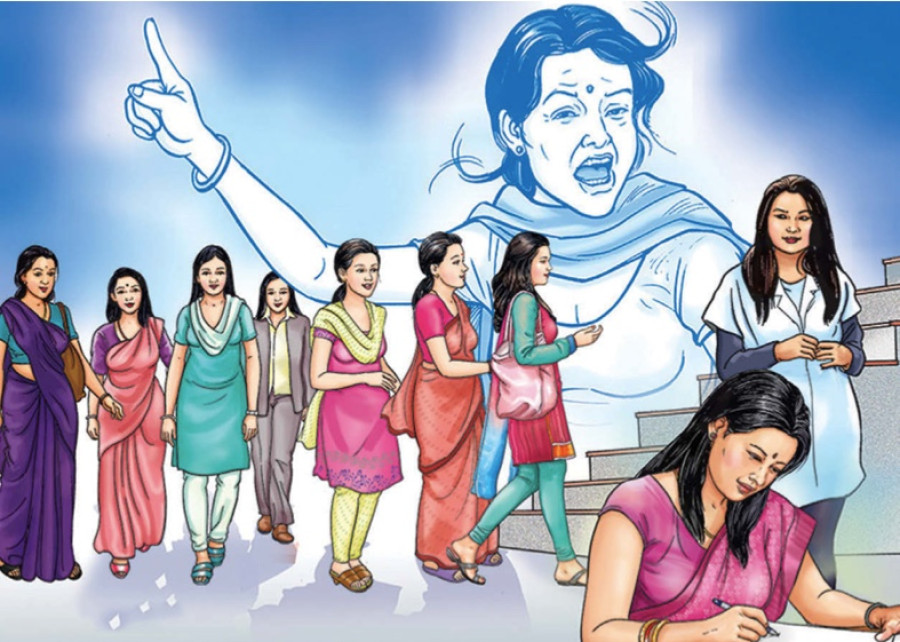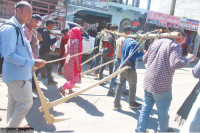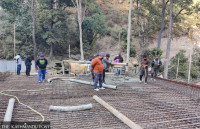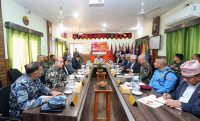National
‘What I do today will make things better for women tomorrow’
Quietly and away from the limelight, across the country women are working on behalf of women to make society more equitable and just for them.
Srizu Bajracharya
Why is a woman lawyer walking into court amusing? Why hasn’t the world accepted women in positions of power? Why aren’t women raised to take risks and be ambitious?
Nima Giri time and again finds herself asking these questions.
But she does not have the time to dwell on them for long. Giri, a lawyer at Pyuthan district court, is busy every day with caseloads, most of which are on behalf of women. What drives her is the realisation that she is representing women who would otherwise not have found able representation in court.
The morning the Post spoke to her last week, she had filed a divorce case on behalf of a woman who had been suffering from domestic violence.
But when she walks into the courtroom she is still addressed as ‘wakil-ni’, the ‘ni’ being the feminine suffix in Nepali and also used to mean the wife of a professional, in this case a lawyer.
And sometimes, when she suits up for a court hearing, her co-professionals, the men, slyly take a jibe at her saying she looks like a model.
“It’s a man’s world—that is what they want me to believe when I walk into the court or wherever I go,” says Giri. “They don’t think a woman can fight and win cases in a court of law, but that’s okay. It is what drives me.”
Giri’s presence in the district court, however, has made justice more accessible for women from the villages in the district, encouraging them to approach the courts.
Since moving back to her hometown from Kathmandu three years ago to practise law, she has fought about 60 cases related to rape, abortion, sexual-and gender-based violence, divorce and property rights.
Giri always has her phone by her side for she knows that someone might need her anytime.
“The equality that we want to see has been slow in coming, and many women here don’t know about their rights. No one really speaks for women here and their voices are lost in the larger conversation of women empowerment,” Giri told the Post over the phone from Pyuthan. “Sometimes I have to receive women at the gate of the court to convince them that their voices will be heard.”
Like Giri, across the country there are today many women who are working to bring about a transformation in the lives of women at the grassroots.They are not only teaching women about their rights but also leading them as an example to work for a more equal and a safer society.
In Pokhariya Municipality, Parsa Salma Khatun is endeared for her leadership. In her three years as deputy mayor, she has become an accessible leader for the vulnerable. She recently helped reinstate a woman of three children in her home after her in-laws abandoned her, according to her.
During the ongoing pandemic as well, her management has been applauded by her colleagues and people in her community.
Khatun went out of her way trying to make sure that the isolation wards for Covid-19 patients and their contacts had everything they needed, such as access to sanitation, sanitary pads, medicines, healthy and enough food and proper beds.
“I think when a woman is leading she can look into aspects that men sometimes overlook and her presence in a system creates space for the unheard,” says Khatun.
In Bardiya, Sapana Chaudhary, a trans woman, has become the face of empowerment. For years, Chaudhary has actively advocated human rights, gender and sex education, public health, HIV/AIDS, and rights of sexual minorities.
And not long ago, according to Chaudhary, under her leadership and initiative and in collaboration with the local government, three gender-neutral public toilets were opened in Gulariya Municipality.
“Things are changing slowly for the better. I see communities are being more open, little by little, although the discrimination we face is still entrenched,” she said. “I have continued to voice issues despite not having financial security and being harassed several times. But what I do today will make things better for women tomorrow.”
Despite women like Giri, Khatun and Chaudhary breaking barriers, it is all too clear to them that although the state has adopted progressive policies for women representation in state institutions, the Nepali community by and large is not yet comfortable with women in leadership.
“Women may have secured representation in government, but the bitter truth is it's mostly a deception because women in positions have not been allowed to exercise their duties and rights,” said Khatun. “And in many instances, when women are not educated, their authority is directed by someone else.”
“Sometimes when I perform my responsibility I feel resistance in terms of acceptance of leadership and people feel that that I am acting up,” she added.
Gunja Ray, a social activist and mediator who is pursuing a degree in law, too has felt this apprehension whilst advocating women’s rights in Dhanusha and Mahottari. Many times in her 13 years in advocacy, during which she has helped hundreds of women, Ray has found her support viewed as an act of provoking women.
“When you have women in local government or leadership, it allows and encourages other women to come forward and reach out for help. Often, I have noticed, women are not ready to seek help because they think the men in these rooms don’t understand them or will take things the other way,” said Ray. “But a woman has the ability to comprehend what it means for a woman to make their way to the process of seeking justice.”
A few months back, she played a crucial role in filing a case of rape and murder of a child with disability at the Janakpur High Court. The family had tried to seek justice from Sarlahi district police office for almost two years.
After police delayed their investigation of the case, she sought the help of the high court to order an investigation.
At Humla District Court, Nabina Chand’s presence as the first woman lawyer in the area has also fortified strength in women there. She has become the go-to person for women in the area, where women are beginning to understand their rights and that they can file cases seeking justice.
“Places like ours don’t see enough women representation but it is where women’s issues from child marriage to teenage pregnancy, Chhaupadi systems to crimes against women are seen in great numbers,” she said. “Therefore, I try to be available in whatever way I can, and seek help from my seniors too to guide me in cases.”
Chand believes that the society around her is changing and even the men around her have been supportive.
“I don’t know if it is because we are in a remote area where the economic condition is poor and there are fewer men and young people, but I see that women-led initiatives have really helped in developing their communities and women have been active here,” she said over the phone from Humla.
Despite the sufferings of women because of the discrimination they face, their collective voice over the years has made a difference.
The women leading in their fields the Post talked to over the past week agreed that things are getting a little better for women but quickly added that their world is still far from reaching equality.
Cases of gruesome violence against women continue to be on the rise, an indication of how society is still resistant to treating women with respect and dignity.
“Representation matters but it hasn’t been meaningful enough to do more and help more women in remote communities,” said Khatun, the deputy mayor. “We are trying to break boundaries and if there are not enough women working on this, change will be hard to come.”
Giri, the Pyuthan-based lawyer, shared similar sentiments.
“We need more women at the grassroots and need more people to recognise that the transformative change we seek in communities is only possible by empowering their voices,” Giri said.
It is not just deputy mayors and lawyers but even ward members—each ward in municipalities across the country must have at least two women members—feel that their work matters.
“It gives me great satisfaction to see that I have become this resourceful person for women who need help,” said Laxmi Gairi, a ward 10 member in Kathmandu Metropolitan City.
Gairi has become the point person for women from lower economic strata seeking justice and she has helped those suffering from domestic violence get access to rehabilitation centres and safe houses.
“I can’t stand injustice and I feel it's important to help encourage women who were unheard to seek justice and to empower them,” she said. “I feel the happiest when I can make an impact on someone's life.”
The satisfaction that these women get from helping the marginalised is what drives them, they said.
“I might not have been able to earn money but I feel happy to be of help to people who need me,” said Ray from Dhanusha.
Giri has worked in the development sector and also been active in party politics but she said she found her place in the legal profession as it has been most satisfying to work directly for justice and change.
“I think I found the greatest satisfaction from working directly with people whose rights we talk about. In many ways, I have been able to work on the change we want to see in our society through this profession,” she said. “It gives me sheer joy to see that my work is significant to women in my community.”
And the men who ridicule her work?
“My work matters and it is not for the men to say where I fit,” was her reply.




 9.17°C Kathmandu
9.17°C Kathmandu













